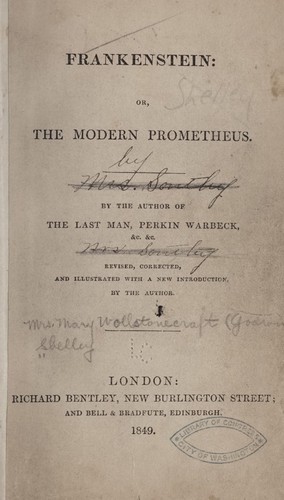Thoughts on reading Frankenstein by Mary Wollstonecraft Shelley.

Mary Shelley’s Frankenstein is often read as a tale of Victor Frankenstien and his Monstrous creation. I argue, however, that if not fully missguided, this reading of the story is at minimum misleading. I believe that Frankenstein is more accurately read as a tale of Victor Frankenstein and the being he created. Though minute, this distinction is necessary in that it indicates to the reader that at inception, Victor Frankenstein’s Creation was just that, a creation, not a monster. I understand the messiness of the discourse surrounding the topic of what makes a being a monster, so I will not attempt to conjecture about the root causes of Frankenstein’s Creation’s monstrous transformation. Instead, this paper will analyze the Creation’s own explanations for its monstrous turn.
Frankenstein and his Creation first meet after the murder of William and death of Justine, they egange in a violent diologue about the Creation’s wreched acts. Eventually, after eluding Frankenstiens assault, the Creation responds with the elegant diatribe:
‘Be calm! … I was benevolent and good; misery made me a fiend … You, my creator, abhor me; what hope can I gather from your fellow creatures, who owe me nothing? They spurn and hate me. (114-115)
The Creation is thus insinuating that like all beings, he was born without malice (noticeably antithetical to the chatholic ideology of original sin), yet others reactions to his physical form made him eternally lonely, and drove him to act in vengeance. It is important to note that the Creation is by no means a sympathetic character: it continually enacts murderous and tortuous deeds on their enemy, showing no actual remorse. But it is valuable to understand the Creation’s rationale for these actions. The Creation claims the hatred he eternally faced brought upon by his unsatisfying appearance justifies his abhorrent acts. There is an implicit understanding in this justification that the atrocious deaths caused by the Creation are in some way balancing the scale of the debilitating loneliness the Creation faces. This thus implies that the Creation holds as equivalence death and loneliness. The base of this argument is not insane. Humans (in this case Human like) creatures are social beings, and being deprived of the joys of interpersonal relationships does maximally dilute the joys of life. However, the extension of the implication enacted by the Creature is inane, as a life devoid of relationships is in no way parallel to the absolute nullity of death. Though Frankenstein’s Creation may not have been born a monster, it certainly became one.